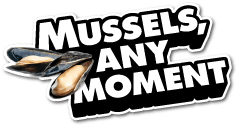Strict food safety requirements
Mussels grow in the wild. They take their food from the water. The natural habitat – the clean, nutritious water – is of crucial importance to the mussel. Although problems rarely occur in the waters of the Wadden Sea or Eastern Scheldt, toxin-forming algae or bacteria can occur in the water, especially when water temperatures are rising. The mussel sector takes this risk into account and the Netherlands Food and Consumer Product Safety Authority (NVWA in Dutch) strictly supervises the waters in which shellfish are cultivated. If the values of samples from an area are too high, then NVWA will pre-emptively close the relevant area until new samples show that the situation has returned back to normal. This so-called early warning and response system ensures that a food-safe product is dispatched to the mussel-processing companies and thus to the market.
This means mussels are only harvested after it is apparent that they are free of harmful algae, bacteria or viruses. Following purchase and registration at the Dutch Mussel Auction, the mussel-processing companies clean them and clear them of sand at the so-called rewatering plots in the Eastern Scheldt or in basins on shore. During this process, the quality is constantly monitored to ensure the safety of the food. The packaging in leakproof plastic containers or (jute) bags ensures a shelf life (if chilled) of approximately 7 days.
